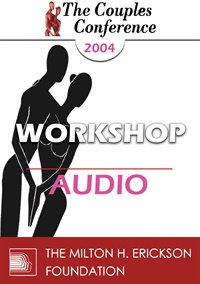CC04 Workshop 15 - Working with Difficult Couples: Domestic Violence I - Cloe Madanes, Lie. Psych.
- Average Rating:
- Not yet rated
- Topic Areas:
- Workshops | Couples Therapy | Domestic Violence | Abuse
- Categories:
- Couples Conference | Couples Conference 2004 | Pioneers in Couples and Family Therapy
- Faculty:
- Cloe Madanes, HDL, LIC
- Duration:
- 1:53:07
- Format:
- Audio Only
- Original Program Date:
- Mar 28, 2004
- License:
- Never Expires.
Description
Description: Exploration of structured strategies for working with violent couples including separation, involving extended family, and addressing spiritual pain. Emphasis on planned interventions, repentance, and accountability from the abusive partner. Techniques discussed include executive meetings in public settings, symbolic rituals, and financial consequences to deter violence. Madanes highlights the role of reparation, community support, and social services in fostering safety and potential reconciliation.
Syllabus Description: Madanes will discuss some difficult cases and participants are invited to present their own cases for consultation and advice from Madanes. Emphasis will be on partner abuse, assessment and intervention, including cultural factors and community resources. A minimum of five to ten participants will have a chance to consult. The group will engage actively in exercises to demonstrate specific techniques.
Educational Objectives:
- To describe the approach of Strategic Marital Therapy.
- Given a case, describe the application of Strategic Marital Therapy.
*Sessions may be edited for content and to preserve confidentiality*
Credits
Handouts
| Timestamped Transcript (705.4 KB) | 15 Pages | Available after Purchase |
| Timestamped Transcript (708.5 KB) | 15 Pages | Available after Purchase |
| Ericksonian Learning Snapshot (246.3 KB) | 2 Pages | Available after Purchase |
Faculty

Cloe Madanes, HDL, LIC Related Seminars and Products
Cloé Madanes, HDL, LIC, is a world-renowned innovator and teacher of family and strategic therapy and one of the originators of the strategic approach to family therapy. She has authored seven books that are classics in the field: Strategic Family Therapy; Behind the One-Way Mirror; Sex, Love and Violence; The Violence of Men; The Secret Meaning of Money; The Therapist as Humanist, Social Activist and Systemic Thinker; and Relationship Breakthrough. She has presented her work at professional conferences all over the world and has given keynote addresses for The Evolution of Psychotherapy Conference, the American Association of Marriage and Family Therapy; the National Association of Social Workers, The Erickson Foundation, the California Psychological Association and many other national and international conferences. Madanes has won several awards for distinguished contribution to psychology and has counseled outstanding individuals from all walks of life.
Reviews
Rating: Not yet rated


